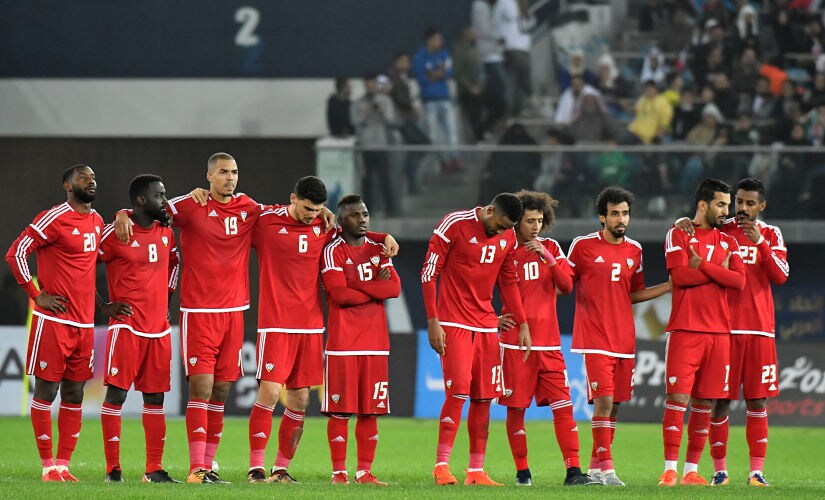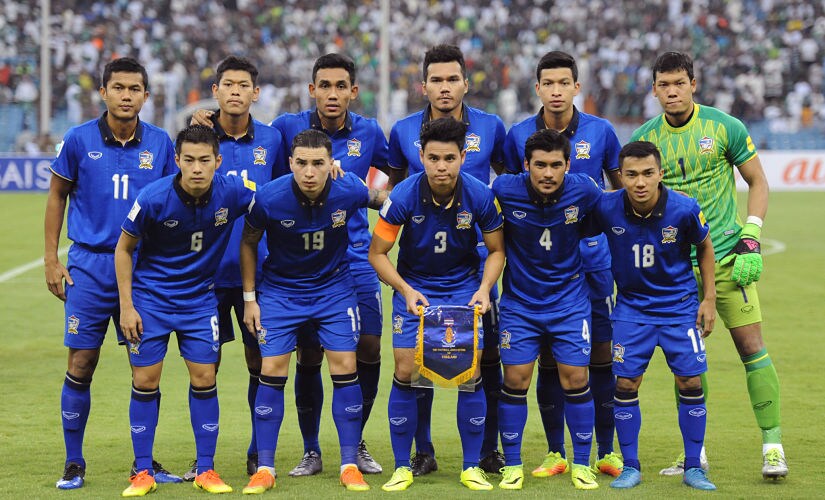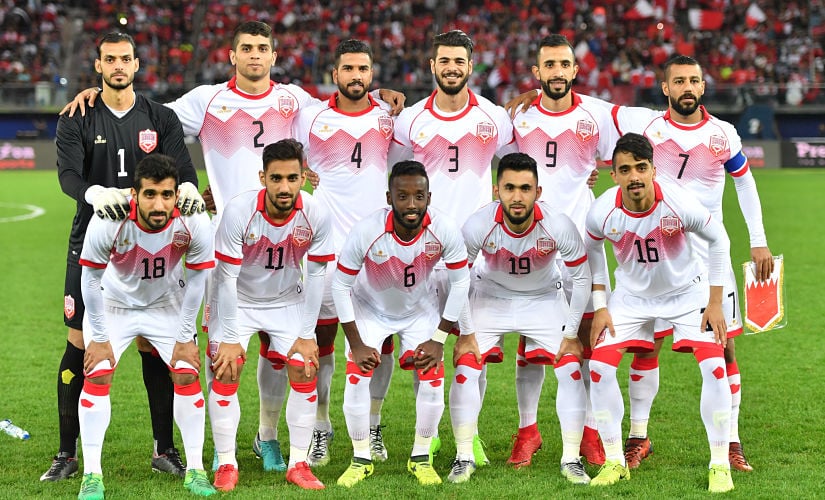India emerged as the second-best ranked (97) team in their AFC Asian Cup group after the draw for the group stage of the 2019 event placed them with hosts United Arab Emirates, Thailand and Bahrain.
On paper, India’s chances may appear bright, but over the years, especially in Asian football, the FIFA rankings have proved to be mere numbers. The Blue Tiger will have their task cut out to stay true to their position on FIFA’s charts, and next month’s four-nation series involving higher-ranked teams such as South Africa and New Zealand is certain to put Stephen Constantine and Co in a better place to reflect on their preparedness for the continental championships.
India have participated in the Asian Cup only on three occasions in the past, with their last two appearances — 2011 and 1984 — ending with the Blue Tigers failing to record a single point.
So there is plenty of room for improvement for India who will be, to an extent, relieved to have avoided the big guns of Asian football. In UAE and Thailand, India have drawn the lowest-ranked teams from Pot A and B respectively, while Bahrain was placed in Pot D that comprised of teams that had a poorer performance in the qualification in comparison to India, who were in Pot C.
With India slated to open its campaign against Thailand on 6 January 2019, before locking horns with hosts UAE and Bahrain, here is a detailed look at each of the three oppositions in India’s group.
United Arab Emirates (UAE)
Profile:
FIFA ranking: 81
AFC rank: 9

UAE national football team during the Gulf Cup of Nations in 2018. AFP
UAE have established themselves among the top footballing nations in the continent after qualifying for their fifth straight finals. Going into the tournament on home soil, UAE have the perfect balance of youth and experience. The average age of the latest squad picked by their Italian coach Alberto Zaccheroni was 28 and the hosts are expected to name a team with similar age profile for the finals in January.
The former Milan manager has wasted no time in implementing his favoured 3-4-3 or 3-4-2-1 system with the Middle-Eastern nation since taking over the role of their manager in October last year. UAE are known for their strength in the middle of the park, and Zaccheroni has been successful in addressing the defensive issues the team had prior to his arrival. Their new shape, however, hasn’t helped them develop as an attacking force. In their last six games, UAE have netted just once.
Omar Abdulrahman is the team’s talisman going forward. The attacking midfielder rose to prominence during the 2015 AFC Asian Cup and has since been a big performer for the Al-Abyad. The 26-year-old has also been linked with moves to Arsenal and Manchester City in the past, something that gives a glimpse of his calibre. Indian midfield will have to keep Abdulrahman under tab if they are to get anything out of the encounter against the hosts.
All the members of the UAE squad play in their domestic leagues and none of their footballers play in top foreign leagues.
Form: The Al-Abyad though haven’t had the best of times recently. Defeat in the final of the Gulf Cup at the hands of Oman was followed by friendly losses against Slovakia and Gabon. UAE are winless in six encounters and have netted just once during that time. Their last win came against Oman in the Gulf Cup-opener.
Performance in Qualification: UAE secured direct qualification to the tournament as hosts of the 2019 AFC Asian Cup. In the qualification for the 2018 FIFA World Cup, UAE reached Round 3 (final round) after finishing as the third-best runner-up in second round of qualification. However, in the final round, UAE dropped out of contention for a place in the World Cup after finishing fourth in their group that consisted of teams like Japan, Saudi Arabia and Australia.
Pedigree: Since entering the competition in 1980, UAE have participated in every Asian Cup, barring the 2000 edition when they failed to qualify. Their best performance came in the 1996 edition at home when they finished runners-up to Saudi Arabia. In the previous Asian Cup in Australia, UAE grabbed the third place.
However, despite being regulars at the continental championships, UAE have only once qualified for the World Cup. In the 1990 edition in Italy, UAE were knocked out in the group stage without registering a single point.
UAE’s current FIFA ranking is 2 spots below their average (79). In 1998, the Al Abyad rose to their all-time highest point in FIFA’s charts when they were placed at the 42nd position.
Going into their 10th Asian Cup finals, UAE will know exactly what to expect and India will need a remarkable performance to get anything against the home side.
Record against India: India have faced UAE 12 times, losing eight, drawing two and winning on 2 occasions. In those games, UAE have scored 24 times, while India have recorded 7 in reply.
India last faced Al Abyad in 2011 when they drew their World Cup qualifier 2-2. India’s last win against UAE came back in 2001 when they recorded a 1-0 win. UAE have won all the games played between the two teams on home soil, and hence India will have odds heavily against them when they face UAE on 10 January 2019.
Thailand
Profile:
FIFA ranking: 122
AFC rank: 24

Thailand's national football team during the Asian Cup qualifying game. AFP
Thailand have reached the finals of the AFC Asian Cup after a gap of 12 years. The War Elephants have shown plenty of progress in recent times. Although their FIFA ranking suggests otherwise, Thailand have regularly made it to the third and final round of the FIFA World Cup qualification, without being successful in reaching the finals.
Under new coach Milovan Rajevac, the Thais have tightened up at the back at the expense of a bit of attacking flair that they displayed in abundance under their former manager Kiatisuk Senamuang.
The Serbian coach employs a 4-5-1 formation to add solidity to their midfield, while highly-rated full-backs Theerathon Bunmathan and Tristan Do provide width to the side.
Chanathip Songkrasin is Thailand’s most influential attacking player. The 24-year-old plies his trade in the J-League and has made a real impression in Japan.
With an average age of 25, Thailand rely more on youth but have enough experienced heads in their ranks to make them tick. All members, except four, play in the Thai league, 3 play in Japan, while goalkeeper Kawin Thamsatchanan is a part of Belgian second-division side OH Leuven.
Despite being ranked 25 places below India in FIFA rankings, Thailand will be more than handful for the Indians. The Blue Tigers will have to find a way to match the agility of Thailand especially in the central area where the War Elephants are expected to outnumber the Indians.
Form: Thailand have won five, lost three and drawn two in their last 10 games. However, the defeats have all come against higher-ranked sides. The War Elephants are expected to face similar level of competition at the Asian Cup, but they will take solace from their 1-1 draw against UAE last June.
Performance in Qualification: Thailand qualified for the 2019 AFC Asian Cup by winning their group in second round of the 2018 FIFA World Cup qualification. The Thais were unbeaten in that group comprising teams like Iraq, Vietnam and Chinese Taipei, winning four out of six matches.
In the final round of World Cup qualification, Thailand finished at the bottom of their group, thus missing out on a place in Russia, but made their presence felt with draws against UAE and Australia.
Pedigree: Thailand will take part in their sixth finals in UAE, but have hardly made waves in the tournament. Barring a third-place finish in the six-team event in 1972 that was somehow achieved without winning a single game, Thailand have failed to progress past the group stage.
In fact, the Thais have won just a single game out of 20 at the finals. This is the poorest record among all teams in Group A, and India will be hoping to make the most of Thailand’s failure to deliver the goods in the finals.
Thailand have also never qualified for a FIFA World Cup, but have dominated proceedings in the AFF championships, winning it five times.
Thailand’s average FIFA ranking is the position that India currently occupy (97), but the War Elephants have risen as high as 45 in 1998. Their current ranking of 122 doesn’t do justice to their calibre.
Record against India: India have played Thailand 23 times in the past with the Thais emerging victorious on 11 occasions. The Blue Tigers have got the better of their opponents five times, while 7 games have ended level-pegging.
India’s last win over Thailand came way back in 1986 in Merdeka tournament. Since then, the Thais have won six out of the seven games played between the two sides.
However, the two teams haven’t met each other in 8 years, a fact that hints to the distinct fortunes the football in the two countries has experienced over the past decade.
Bahrain
Profile:
FIFA ranking: 116
AFC rank: 20

Bahrain football team during the 2017 Guld Cup of Nations. AFP
Bahrain are the rising force of Asian football and have reached the Asian Cup finals for the fifth time running. Al-Ahmar are a young team that are very difficult to beat. Under coach Miroslav Soukup, Bahrain have lost just 6 out of their 24 matches, and most of the losses have been by single-goal margin.
With an average age of 25, Al-Ahmar have players with great energy and their superior fitness levels make them a tough team to face.
Bahrain are extremely resilient and have a knack of scoring late goals to turn the result in their favour.
India will face Bahrain in the final group game on 14 January and this will be the last team Constantine would have wanted to play in a clash that could determine India’s passage to the next round.
Form: Bahrain have won 4, drawn 5 and lost just once in their last 10 games. Their recent 4-0 win over Turkmenistan — an opponent against which India lost both its matches in the second round of FIFA World Cup qualifiers — would set them in the right frame of mind in the final leg of preparations ahead of the UAE event.
Performance in Qualification: Bahrain qualified for the finals after winning their group in the third round of the AFC Asian Cup qualification. Similar to India, Al-Amhar won four matches and drew two to finish with 13 points in the group.
In the 2018 FIFA World Cup qualifiers, Bahrain could only finish fourth in their group, thus failing to reach the third round of World Cup qualification.
Pedigree: Bahrain will make their sixth appearance in the finals and their fifth straight one since 2004. Their best performance did come in 2004 when they finished fourth. Since then, Al-Amhar have failed to progress past the group stages. However, Bahrain have registered a win in each of their last four campaigns.
The Middle Eastern nation has never qualified for a FIFA World Cup, but twice came within a game to reach the World Cup finals in 2006 and 2014, when the nation lost out in the final playoffs.
The average FIFA ranking for Bahrain is 99, but they currently sit 23 places below it. In 2004, Bahrain did reach their all-time high of 49.
Record against India: India and Bahrain have met just five times in history, but India have never managed to beat their opponents. Al-Amhar have won on four occasions — that includes a 5-2 loss for the Blue Tigers in the 2011 Asian Cup finals.
That was the only meeting between the two teams in the last 25 years, but India’s poor record against Bahrain, like the other teams in the group, will concern Constantine.
India may have been on the up in recent times, having stitched together a 13-game unbeaten streak. However, the Blue Tigers have inferior history and records against the teams in their group. India will have to conjure an extremely special performance in UAE if they are to reach the knockout stages of the AFC Asian Cup.
Updated Date: May 07, 2018 08:24 AM



